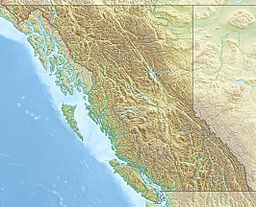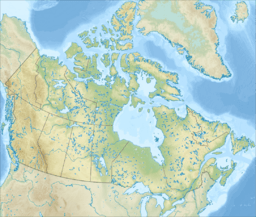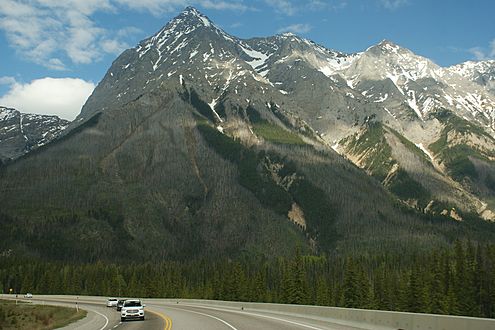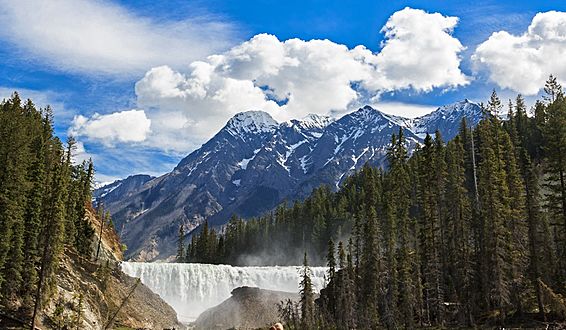Chancellor Peak facts for kids
Quick facts for kids Chancellor Peak |
|
|---|---|
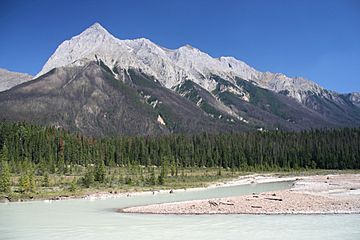
Chancellor Peak
|
|
| Highest point | |
| Elevation | 3,266 m (10,715 ft) |
| Prominence | 726 m (2,382 ft) |
| Parent peak | Mount Vaux (3310 m) |
| Listing | Mountains of British Columbia |
| Geography | |
| Location | British Columbia, Canada |
| Parent range | Ottertail Range Canadian Rockies |
| Topo map | NTS 82N02 |
| Geology | |
| Age of rock | Cambrian |
| Type of rock | sedimentary rock |
| Climbing | |
| First ascent | 1901 James Outram, J.H. Scattergood, G.M. Weed, Christian Hasler Sr. |
| Easiest route | Mountaineering |
Chancellor Peak is a tall mountain, about 3,266 meters (10,715 feet) high. It is located in Yoho National Park in British Columbia, Canada. This impressive peak is part of the Canadian Rockies and stands out in the Kicking Horse River valley. You can easily spot it from the Trans-Canada Highway between the towns of Golden and Field. Its closest taller neighbor is Mount Vaux, which is about 4 kilometers (2.5 miles) away. Both peaks belong to the Ottertail Range.
Contents
History of Chancellor Peak
Why is it Called Chancellor Peak?
The mountain got its name in 1898. It was named to honor Sir John Alexander Boyd (1837–1916). He was a very important judge, known as the Chancellor of the High Court of Justice of the Province of Ontario.
First People to Climb the Peak
The first ascent of Chancellor Peak happened on July 30, 1901. A team of climbers reached the top. This team included James Outram, J. Henry Scattergood, and George M. Weed. They were guided by Christian Hasler Sr.
Outram wrote about the mountain's amazing appearance. He described it as a "mighty pyramid" with "frowning precipices." He felt it looked "black and forbidding" and would make travelers feel "awe and grandeur."
Official Recognition of the Name
The mountain's name, Chancellor Peak, was officially approved in 1924. This approval came from the Geographical Names Board of Canada.
How Chancellor Peak Was Formed
Chancellor Peak is made of a type of stone called sedimentary rock. This rock was formed a very long time ago, during the Cambrian period. Back then, this area was covered by shallow seas. Over millions of years, layers of sand, mud, and tiny sea creatures settled and hardened into rock.
Later, during a major event called the Laramide orogeny, huge forces pushed the Earth's crust. This caused the sedimentary rock to fold and lift up. It was even pushed over the top of younger rock layers. This process created the tall mountains we see today, including Chancellor Peak.
Weather and Water Around Chancellor Peak
Climate Conditions
Chancellor Peak is located in a subarctic climate zone. This means it has very cold and snowy winters. Summers are usually mild. Temperatures can drop below −20 °C (–4 °F). With the wind chill, it can feel even colder, sometimes below −30 °C (–22 °F).
Water Flow
Rain and melting snow from Chancellor Peak flow into the Kicking Horse River. This river is an important waterway. It eventually joins the Columbia River, which is one of the largest rivers in North America.
Pictures of Chancellor Peak
 | George Robert Carruthers |
 | Patricia Bath |
 | Jan Ernst Matzeliger |
 | Alexander Miles |


